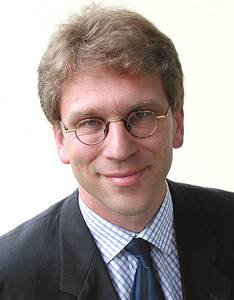World Council of Churches (WCC) general secretary-elect Rev. Dr Olav Fykse Tveit was asked on August 28 to outline his vision for the organization. He didn’t have to look far for inspiration.
A tapestry on the wall just to his left at the press conference, in the same hall where he was elected to the office the day before, displayed the words – in Greek – of Christ’s prayer in John 17: ". . . that they all may be one".
"That is the foundation of the World Council of Churches, and its goal," said Tveit, currently general secretary of the Church of Norway Council on Ecumenical and International Relations. "Any vision for this work has to make that vision visible. It’s not the old agenda; it’s the new agenda, as well."
Tveit went on to say that the WCC has particular gifts to offer the world, including a strong legacy of service, a unique global access through its network of churches, and a talented group of staff and members who can be God’s hands around the world.
Those gifts will be needed to address four major areas that Tveit identified as priorities at a press conference August 28: solidarity among the world’s Christians, interreligious relationships, broader ecumenical connections and justice issues.
Rev. Tveit said many Christians today are minorities in the communities and countries where they live, or in areas that are suffering from violence or extreme poverty, or both.
"We can raise the voice of others, and we can strengthen the voice of others," he said, noting the importance of accompaniment and advocacy.
In regard to inter-religious relations, the Scandinavian theologian said dialogue and work with Islam is particularly important in the current time. He cited the positive relationships he has had in his native Norway as moderator of the Church of Norway–Islamic Council of Norway contact group. Churches, he noted, have "great potential" to break down the various barriers that exist in the world.
He said the road forward begins with a simple premise: to "see one another as fellow human beings. All faiths call us to that."
That same view, he said, needs to extend to the many Christian churches and faith groups who are not among the 349 member churches of the WCC. The ecumenical tradition has historically consisted of mainline Protestant churches, as well as Orthodox churches, but does not include evangelicals and Pentecostals. He described today’s Christianity as "sensible global church family." Tveit said cooperation among the various bodies is important for a common witness, as well as for areas "where we can challenge one another".
He believes it is important to maintain and develop cooperation with the Roman Catholic Church. "The contribution of the Roman Catholic Church to theological work, and also in regard to many social and ethical problems, is very important," Rev. Tveit explained. The Roman Catholic Church is not a WCC member but has a long-standing working relationship. He also said he hoped to meet with Pope Benedict XVI. "I would like to speak with him about our common challenges, but also about our common faith. I have heard him speak and I have read his works, and he is a very important figure for mutual understanding between Christians. I think we have much to discuss together," he told the media.
And on justice issues, he pointed to the effects of climate change as one example. He noted the experiences of his region – particularly Greenland, which has dealt with “dramatic melting” of its snow and ice pack – as well as the Pacific, where some islands are slowly being submerged.
"To hear the voices (of those) who live with these changes now, not just what might happen in the future, is something very different,” Tveit said. He emphasized in answers to later questions that it is “a Christian duty to respond to the needs of our neighbour".
He touched on a host of other issues during the 40-minute press conference, acknowledging that he has much to learn, reflect on and pray about in the four-plus months until he officially takes office. He said again that he’s looking forward to the work ahead, despite its daunting scope.

